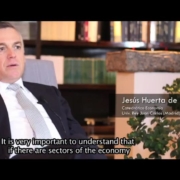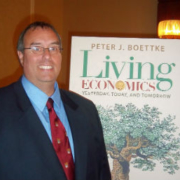Gross And Net Product
The other day I happened to be talking to a politician who was also a successful entrepreneur. He knew of the absurdity that when there is more taken in tax receipts or borrowed from future taxpayers, this extraction of wealth adds to the GDP statistics. Creating more outside money via QE does the same. All activities like this say nothing about the health of the economy.
Now two entrepreneurs talking together instinctively know that “turnover is vain and profit is sanity,” i.e., what we are concerned with is the profits or health of our companies, and not whether they have a bloated balance sheet or high turnover.
The salesman who comes back and waxes lyrical about his enormous success at winning a megabuck contract is met with suspicion by the entrepreneur-owner until the critical question of “what net margin do we make?” is answered satisfactorily.
The book Capitalism by George Reisman — one of only four hand-picked PhD students of Mises — goes into great detail on why the GDP statistic is an absurdity and how we miss accounting for two thirds of the real economy (Chapter 15, pages 673-682). I strongly recommend a read.
Mark Skousen has also exposed some absurdities and proposed better measures (PDF), and our very own contributor Sean Corrigan and our founding fellow, Anthony Evans have their own measure centred on the measuring of the private productive sector of the economy.
![books[1]](http://109.104.118.106/~toby/wp-content/uploads/2013/07/books1.png) I recently was blessed to find a pristine first edition of Ludwig von Mises’s 1922 book Socialism in the original German and the first English language translation from 1932.
Re-reading this definitive demolition of all socialist arguments, I thought this small section, written some 30 years before politicians became infatuated with GDP statistics, would be worthwhile blogging about.
I recently was blessed to find a pristine first edition of Ludwig von Mises’s 1922 book Socialism in the original German and the first English language translation from 1932.
Re-reading this definitive demolition of all socialist arguments, I thought this small section, written some 30 years before politicians became infatuated with GDP statistics, would be worthwhile blogging about.
Gross and Net Product
The most ambitious attempt to contrast productivity and profitability derives from the examination of the relationship between gross product and net product. It is clear that every entrepreneur in the capitalist system aims at achieving the largest net product. But it is asserted that rightly considered the object of economic activity should be to achieve not the largest net product but the largest gross product. This belief, however, is a fallacy based upon primitive speculations regarding valuation. But judged by its widespread acceptance even today it is a very popular fallacy. It is implicit when people say that a certain line of production is to be recommended because it employs a large number of workers, or when a particular improvement in production is opposed because it may deprive people of a living. If the advocates of such views were logical they would have to admit that the gross product principle applies not only to labour but also to the material instruments of production. The entrepreneur carries production up to the point where it ceases to yield a net product. Let us assume that production beyond this point requires material instruments only and not labour. Is it in the interest of society that the entrepreneur should extend production so as to obtain a larger gross product? Would society do so if it had the control of production? Both questions must be answered with a decided no. The fact that further production does not pay shows that the instruments of production could be applied to a more urgent purpose in the economic system. If, nevertheless, they are applied to the unprofitable line then they will be lacking in places where they are more urgently needed. This is true under both Capitalism and Socialism. Even a socialist community, supposing it acted rationally, would not push certain lines of production indefinitely and neglect others. Even a socialist community would discontinue a particular line of production when further production would not cover the expense, that is to say, at the point where further production would mean failure to satisfy a more urgent need elsewhere. But what is true of the increased use of material instruments is true exactly in the same way of the increased use of labour. If labour is devoted to a particular line of production to the point where it only increases the gross product while the net product declines, it is being withheld from some other line where it could perform more valuable service. And here, again, the only result of neglecting the principle of net product is that more urgent wants remain unsatisfied whilst less urgent ones are met. It is this fact, and no other which is made evident in the mechanism of the capitalist system by the decline in the net product. In a socialist community it would be the duty of the economic administration to see that similar misapplications of economic activity did not occur. Here, therefore, is no discrepancy between profitability and productivity. Even from the socialist standpoint, the largest possible net product and not the largest possible gross product must be the aim of economic activity. Nevertheless, people continue to maintain the contrary, sometimes of production in general, sometimes of labour alone and sometimes of agricultural production. That capitalist activity is directed solely toward the attainment of the largest net product is adversely criticized and State intervention is called for to redress the alleged abuse. This discussion has a lengthy ancestry. Adam Smith maintained that different lines of production should be regarded as more or less productive according to the greater or smaller amount of labour which they set in motion.29 For this he was adversely criticized by Ricardo who pointed out that welfare of the people increased only through an enlargement of the net product and not of the gross product.30 For this Ricardo was severely attacked. Even J. B. Say misunderstood him and accused him of an utter disregard for the welfare of so many human beings.31 While Sismondi, who was fond of meeting economic arguments by sentimental declamations, thought he could dispose of the problem by witticism: he said that a king who could produce net product by pressing a button would, according to Ricardo, make the nation superfluous.32 Bernhardi followed Sismondi on this point.33 Proudhon went as far as to epitomize the contrast between socialistic and private enterprise in the formula: that although society must strive for the largest gross product the aim of the entrepreneur is the largest net product.34 Marx avoids committing himself on this point, but he fills two chapters of the first book of Das Kapital with a sentimental exposition in which the transition from intensive to extensive agricultural methods is depicted in the darkest colour as, in the words of Sir Thomas More, a system “where sheep eat up men,” and manages in the course of this discussion to confuse the large expropriations achieved by the political power of the nobility, which characterized European agrarian history in the first centuries of modern times, with the changes in the methods of cultivation initiated later on by the landowners.35 Since then declamations on this scheme have formed the stock equipment of the controversial writings and speeches of the socialists. A German agricultural economist, Freiherr von der Goltz, has tried to prove that the attainment of the largest possible gross product is not only productive from the social point of view but is also profitable from the individual point of view. He thinks that a large gross product naturally presupposes a large net product, and to that extent the interests of the individuals whose main object is to achieve a large net product coincide with those of the State which desires a large gross product.36 But he can offer no proof of this. Much more logical than these efforts to overcome the apparent contrast between social and private interests by ignoring obvious facts of agricultural accountancy, is the position taken up by followers of the romantic school of economic thought, particularly the German etatists, viz. that the agriculturist has the status of a civil servant, and is therefore obliged to work in the public interest. Since this is said to require the largest possible gross product it follows that the farmer, uninfluenced by commercial spirit, ideas or interests, and regardless of the disadvantages, which may be entailed, must devote himself to the attainment of this end.37 All these writers take it for granted that the interests of the community are served by the largest gross product. But they do not go out of their way to prove it. When they do try, they only argue from the point of view of Machtpolitik (power politics) or Nationalpolitik (national policy). The State has an interest in a strong agricultural population since the agricultural population is conservative; agriculture supplies the largest number of soldiers; provision must be made for feeding the population in time of war and so on. In contrast to this an attempt to justify the gross product principle by economic reasoning has been made by Landry. He will only admit that the effort to attain the greatest net product is socially advantageous in so far as the costs which no longer yield a profit arise from the use of material instruments of production. When the application of labour is involved he thinks quite otherwise. Then, from the economic point of view the application of labour costs nothing: social welfare is not thereby diminished. Wage economies which result in a diminution of the gross product are harmful.38 He arrives at this conclusion by assuming that the labour force thus released could find no employment elsewhere. But this is absolutely wrong. The need of society for labour is never satisfied as long as labour is not a “free good.” The released workers find other employment where they have to supply work more urgent from the economic point of view. If Landry were right it would have been better if all the labour-saving machinery had never existed, and the attitude of those workers who resist all technical innovations which economize labour and who destroy such machinery would be justified. There is no reason why there should be a distinction between the employment of material instruments and of labour. That, in view of the price of the material instruments and the price of their products, an increase of production in the same line is not profitable, is due to the fact that the material instruments are required in some other line to satisfy more urgent needs. But this is equally true of labour. Workers who are employed in unprofitably increasing the gross product are withheld from other lines of production in which they are more urgently required. That their wages are too high for an increase in production involving a larger gross product to be profitable, results indeed from the fact that the marginal productivity of labour in general is higher than in the particular line of production in question, where it is applied beyond the limits determined by the net product principle. There is no contrast whatever here between social and private interests: a socialist organization would not act differently from an entrepreneur in the capitalist organization. Of course there are plenty of other arguments which can be adduced to show that adherence to the net product principle may be harmful. They are common to all nationalist-militarist thinking, and are the well-known arguments used to support every protectionist policy. A nation must be populous because its political and military standing in the world depends upon numbers. It must aim at economic self-sufficiency or at least it must produce its food at home and so on. In the end Landry has to fall back on such arguments to support his theory.39 To examine such arguments would be out of place in a discussion of the isolated socialist community. But if the arguments we have examined are untrue it follows that the socialist community must adopt net product and not gross product as the guiding principle of economic activity. The socialist community equally with the capitalist society will also transform arable into grass land, if it is possible to put more productive land under the plough elsewhere. In spite of Sir Thomas More, “sheep will eat up men” even in Utopia, and the rulers of the socialist community will act no differently from the Duchess of Sutherland, that “economically instructed person,” as Marx once jeeringly called her.40 The net product principle is true for every line of production. Agriculture is no exception. The dictum of Thaer, the German pioneer of modern agriculture, that the aim of the agriculturist must be a high net yield “even from the standpoint of the public welfare” still holds good.41 [29. ]A. Smith, An Inquiry into the Nature and Causes of the Wealth of Nations, Book II, Chap. V (London 1776, Vol. I, pp. 437 ff.). [30. ]Ricardo, Principles of Political Economy and Taxation, Chap. XXVI (Works, ed. MacCulloch, 2nd ed. [London 1852] pp. 220 ff.). [31. ]Say, in his Notes to Constancio’s French Edition of Ricardo’s works, Vol. II (Paris, 1819), pp. 222 ff. [32. ]Sismondi, Nouveaux Principes d’Économie Politique (Paris, 1819), Vol. ii, p. 331 footnote. [33. ]Bernhardi, Versuch einer Kritik der Grande, die für grosses und kleines Grundeigentum angeführt werden (Petersburg, 1849), pp. 367 ff.; also Cronbach, Das landwirtschaftliche Betriebsproblem in der deutschen Nationalökonomie bis zur Mitte des 19. Jahrhunderts (Vienna, 1907), pp. 292 ff. [34. ]“La société recherche le plus grand produit brut, par consequent la plus grande population possible, parce que pour elle produit brut et produit net son identiques. Le monopole, au contraire, vise constamment au plus grand produit net, dût-il ne l’obtenir qu’au prix de l’extermination du genre humain.” (“Society seeks the largest gross product and thus the largest possible population, because for it gross product and net product are the same thing. On the other hand, monopoly continually aims at the highest net product which it can obtain only at the price of exterminating the human race.”) Proudhon, Système des contradictions économiques ou philosophie de la misère (Paris, 1846), Vol. I, p. 270. In Proudhon’s language “Monopoly” means the same as Private Property. Ibid., Vol. i, p. 236; also Landry, L’utilité sociale de la propriété individuelle (Paris, 1901), p. 76. [35. ]Marx, Das Kapital, Vol. I, pp. 613-726. The arguments about “the theory of compensation for the workers displaced by machinery” (ibid., pp. 403-12) are vain in view of the Marginal Utility Theory. Publisher’s Note: The page references cited here are pp. 738-821 and 478-488, respectively, in the English edition. [36. ]Goltz, Agrarwesen und Agrarpolitik, 2nd ed. (Jena, 1904), p. 53; also Waltz, Vom Reinertrag in der Landwirtschaft (Stuttgart and Berlin, 1904), pp. 27 ff. Goltz contradicts himself in his arguments, for, to the assertion mentioned above, he adds immediately: “Nevertheless the amount remaining as net profit from the gross product after deducting costs varies considerably. On the average it is greater with extensive than with intensive cultivation.” [37. ]See Waltz, op. cit. pp. 19 ff. on Adam Müller, Bülow-Cummerow and Phillipp v. Arnim, and pp. 30 ff. on Rudolf Meyer and Adolf Wagner. [38. ]Landry, L’utilité sociale de la propriété individuelle, pp. 109, 127 ff. [39. ]Landry, L’utilité sociale de la propriété individuelle, pp. 109, 127 ff. [40. ]Marx, Das Kapital, Vol. I, p. 695. [41. ]Quoted by Waltz, Vom Reinertrag in der Landwirtschaft, p. 29.













